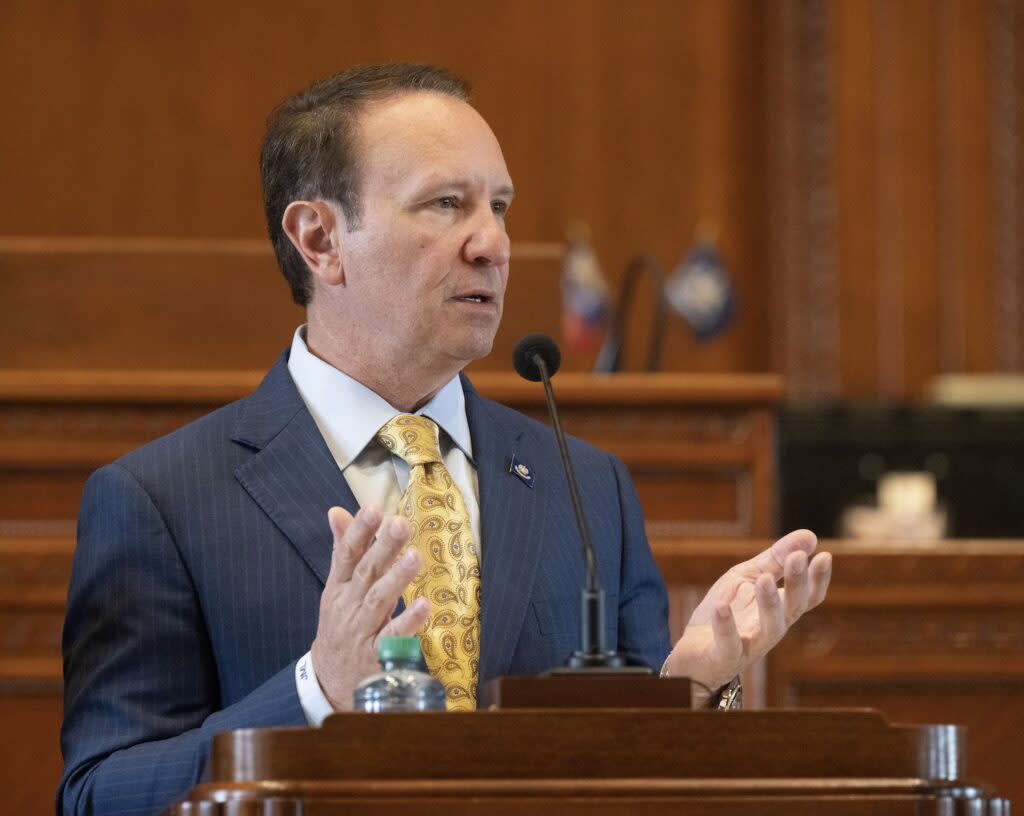Gov. Jeff Landry, in dispute with state ethics board, might gain more control over its members

- Oops!Something went wrong.Please try again later.
- Oops!Something went wrong.Please try again later.
Louisiana Gov. Jeff Landry delivers his address to state lawmakers on opening day of the regular legislative session, Monday, March 11, 2024, at the Louisiana State Capitol in Baton Rouge. (John Ballance/The Advocate, Pool)
Gov. Jeff Landry has yet to resolve a months-long dispute with the Louisiana Board of Ethics for failing to disclose private flights he took to Hawaii on a campaign donor’s plane.
Now, state lawmakers may give Landry more control over the board that seeks to discipline him.
Senate Bill 497 would give the governor direct control over who fills the majority of the ethics board seats. Its would go into effect Aug. 1.
“We have a serious history of corruption in Louisiana,” Steven Procopio, president of the Public Affairs Research Council of Louisiana (PAR), said during a hearing on the legislation this week. “Given our history, given our data, I cannot understand why we would undermine the ethics board by allowing unfettered control by the governor.”
That complaint hasn’t stopped lawmakers with going along with the bill. The House and Governmental Affairs Committee approved it on a 7-6 vote Tuesday, and the Senate voted for the proposal 27-10 last month.
The bill now awaits a full House vote but must go back to the Senate for approval of amendments before it’s sent to the governor for consideration.
The ethics board regulates elected officials, public employees and lobbyists at all levels of government. It deliberates on campaign finance violations and conflicts of interest, among other matters.
Under current law, leaders from Louisiana’s private universities and colleges nominate five people for each of the 11 seats on the ethics board, and then the governor and state lawmakers pick their appointees from those lists. The governor gets to pick seven members and the state lawmakers select four respectively.
Senate Bill 497, sponsored by Sen. Blake Miguez, R-New Iberia, would take the independent college and university leaders out of the process, effectively leaving the governor to appoint seven ethics board members on his own.
“The current selection process for board members is onerous, complicated and completely arbitrary,” Miguez said. “I just don’t think it’s appropriate to have that structure in place.”
Miguez worries the majority of the private college and university leaders involved in the nominating process are in New Orleans, giving the city outsized influence over the ethics board.
“It’s almost like New Orleans is deciding the nomination process here,” he said.
Barry Erwin, with the Council for A Better Louisiana, disagreed with Miguez, saying the current ethics board process is in place to prevent “the fox from guarding the hen house.” Private colleges and universities are involved to insulate the members board from political pressure, he said.
“We would like to see that continue. Keep the politics out of it,” said Erwin, whose organization is made up of business and nonprofit group leaders from across the state.
Procopio said his organization, PAR, was among those who advocated for the current nominating system put in place two decades ago. Louisiana has had more federal convictions for public corruption per capita than any other state in the country, signaling government officials need stronger oversight, he said.
“I see this very much as a backward move. I see this as undermining a very important board for fighting corruption,” Procopio said.
In advocating for his bill, Miguez said governors in Texas and Mississippi are allowed to pick their own members to those states’ ethics boards, but Procopio said those panels are structured differently.
In Texas, half of the ethics board isn’t picked by the governor. In Mississippi, only two of eight ethics board members are the governor’s choices, Procopio said.
Procopio said his staff could only find 12 states where the governor gets to appoint most of its ethics board. In some of those instances, other restrictions apply. In South Dakota, for example, the governor can only pick retired judges to serve.
Erwin and Procopio said their objections to the proposed changes aren’t about the current governor. They think the structural shift is problematic, regardless of who is in office.
“It’s not about Gov. Landry,” Erwin said.
Landry is in an active dispute with the ethics board over a penalty he must pay for violating an ethics law however.
Its members want to penalize Landry for failing to disclose flights he took to and from Hawaii in 2021 when he was attorney general. An attorney representing the governor and the ethics board are still in negotiations over what the reprimand might be. The next status update is scheduled for July.
The board charged Landry and one of the companies owned by the private plane owner, retired energy executive Greg Mosing, in August when Landry, a Republican, was running for governor. Landry took Mosing’s plane to travel to and from an attorneys general conference where he was speaking.
The conference took place from June 14-18. The plane carrying him arrived in Hawaii June 10 and returned to Lafayette June 19, according to ethics board documents.
The board said Landry failed to disclose that he had received something of value for performing his public job, as state law requires.
Last fall, Landry and Mosing accused former Gov. John Bel Edwards, a Democrat, of weaponizing the ethics board to pursue them over the Hawaii trip.
“John Bel’s ‘unethical’ ethics board – made up of majority democrat appointees to smear his political opponents — is attempting to sully my name because I have been friends with Jeff Landry for over 20 years, and Jeff is the leading candidate to replace him,” Mosing said in a written statement at the time.
Edwards responded to those accusations by saying he didn’t know the majority of ethics board members personally, presumably because he selected them from a list provided by the leaders of the private colleges and universities.
“They are not really people that I seek out, and really they’re not even people that I know, with I think the single exception of being Butch Speer, who is the former clerk of the [Louisiana] House,” Edwards said at the time.
Edwards held a seat in the Louisiana House when Speer was clerk.
The ethics board also chastised Landry in 2022 over a separate case, where he inappropriately used campaign funds to pay his car loan, but it didn’t charge him with a violation in that matter.
GET THE MORNING HEADLINES DELIVERED TO YOUR INBOX
The post Gov. Jeff Landry, in dispute with state ethics board, might gain more control over its members appeared first on Louisiana Illuminator.


